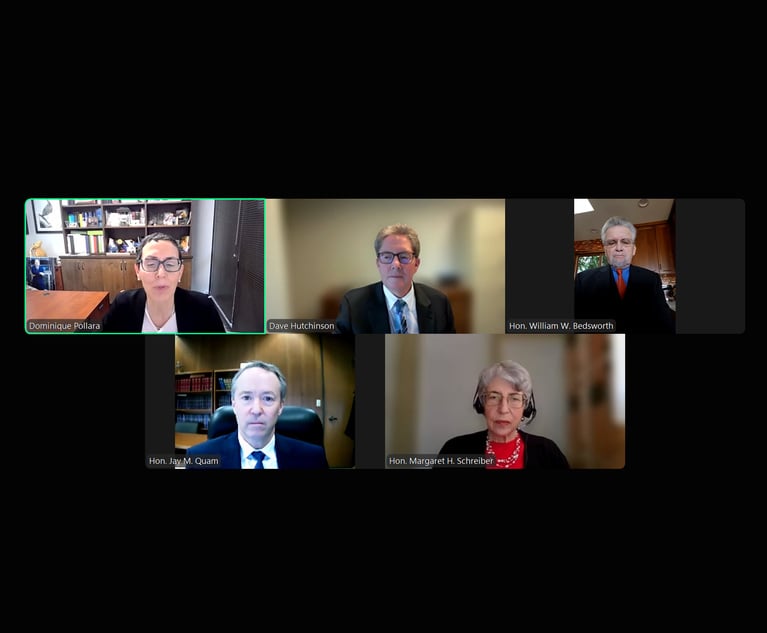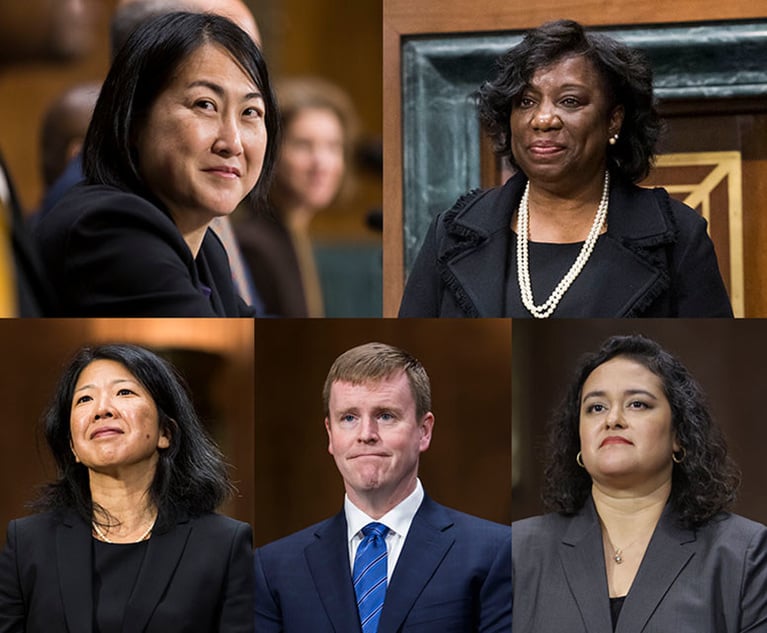 Apple's iPhone 6.
Apple's iPhone 6.5 Things to Know About Apple's $500M Throttling Settlement
Apple Inc. has agreed to pay between $310 million and $500 million to settle class actions alleging that it surreptitiously slowed older iPhones with software upgrades. The deal would include potentially $25 payments to class members and $93 million in attorney fees.
March 02, 2020 at 04:33 PM
5 minute read
Apple Inc. has agreed to pay up to $500 million to settle class actions alleging that it surreptitiously slowed older iPhones with software upgrades.
Apple said it admitted no wrongdoing but agreed to settle "to eliminate the burdens, distractions, expense and uncertainty of protracted litigation," according to the settlement agreement filed Feb. 28. In a motion for preliminary approval of the settlement, plaintiffs attorneys Joseph Cotchett, principal at Cotchett, Pitre & McCarthy in Burlingame, California, and Laurence King, of Kaplan Fox & Kilsheimer in Oakland, California, who are co-lead counsel of the multidistrict litigation, said that iPhone customers, as class members, would be eligible for $25 payments under the settlement.
"The settlement provides substantial relief to Apple consumers and, going forward, will help ensure that customers are fully informed when asked to update their products," wrote Cotchett in an email. He said the deal was one of the largest consumer product settlements, excluding automobile defect cases such as the Volkswagen emissions scandal.
"This historic settlement represents years of investigation and hotly contested litigation," wrote Mark Molumphy, another principal at Cotchett Pitre. "We are extremely proud to submit this resolution to the court and, if approved, providing immediate cash payments to impacted Apple customers."
Apple representatives and its lawyers, Ted Boutrous and Christopher Chorba, both Los Angeles partners at Gibson, Dunn & Crutcher, did not respond to a request for comment. In court documents, Apple had insisted that the decreased performance speed was necessary in order to stop unexpected shutdowns.
The settlement goes before U.S. District Judge Edward Davila in San Jose, California, on April 3. The deal is subject to the Northern District of California's 2018 guidelines for class actions, as well as Federal Rule 23 of Civil Procedure.
Here are five notable aspects of the settlement:
1. Class members might receive $25 or much, much more.
The settlement includes a non-reversionary fund valued at a $310 million minimum and maximum of $500 million, but the $25 payment depends on how many class members make claims. According to court documents, claims of less than $310 million could result in payments of up to $500 per class member. Claims exceeding $500 million would result in less than $25. The $25 is in addition to a $50 credit Apple offered soon after admitting in 2018 to installing software updates in older iPhones that slowed their battery life.
2. The number of law firms on the case doubled.
Plaintiffs attorneys estimated they would seek $93 million, or 30% of the $310 million fund. The fees, they wrote, include a lodestar of nearly $30 million, which excludes work spent after Nov. 30 or in the related California state court litigation. Davila appointed 39 lawyers to lead the cases—one of the largest leadership teams in recent multidistrict litigation—but more than twice that number of law firms signed the settlement agreement. Molumphy said the additional firms include those that filed cases in California state courts, included in the settlement, or after creation of the MDL.
3. The case originally covered an international class.
The settlement excludes all iPhone users outside the United States. Although the second amended class action included class members from the United States and 39 other countries, plaintiffs lawyers cited "the substantial uncertainty as to the propriety of a worldwide class." They also noted that Davila, in his second dismissal order issued last year, was amenable to some of Apple's concerns involving non-U.S. class members. "Those claims can still be pursued by residents of those other countries in those other countries, or here," Molumphy said. "They're just not part of this class action settlement." The settlement includes service awards of $1,500 to $3,500 for 132 named plaintiffs.
4. The settlement withstood sanctions.
According to the motion for preliminary approval, plaintiffs lawyers conducted 19 depositions and produced more than 7 million pages of documents, but, last year, Davila sanctioned Cotchett and Molumphy for disclosing confidential information at a hearing, a move that Apple had called a "blatant and very serious violation" of a protective order. Davila had not certified the class or ruled on summary judgment, so "it is not an overstatement to say that named plaintiffs faced significant risk," they wrote in the motion.
5. Lawyers expect a potentially high claim rate.
The motion cited a 2019 study by the Federal Trade Commission that found claims rates in 124 consumer class actions fell between 4% and 5%. "Here, class counsel expect the claims rate to be at the high end of the range, or greater, taking into consideration not only defendant's brand recognition, but also the fact that the settlement administrator will be providing direct notice to settlement class members, as well as the substantial media coverage of the issues in the case," the motion says.
This content has been archived. It is available through our partners, LexisNexis® and Bloomberg Law.
To view this content, please continue to their sites.
Not a Lexis Subscriber?
Subscribe Now
Not a Bloomberg Law Subscriber?
Subscribe Now
NOT FOR REPRINT
© 2024 ALM Global, LLC, All Rights Reserved. Request academic re-use from www.copyright.com. All other uses, submit a request to [email protected]. For more information visit Asset & Logo Licensing.
You Might Like
View All
'Appropriate Relief'?: Google Offers Remedy Concessions in DOJ Antitrust Fight
4 minute read
'Serious Disruptions'?: Federal Courts Brace for Government Shutdown Threat
3 minute read
‘It's Your Funeral’: On Avoiding Damaging Your Client’s Case With Uncivil Behavior

Practice Tips From—and About—the New Judges on the Northern District of California Bench
Law Firms Mentioned
Trending Stories
- 1Decision of the Day: Judge Reduces $287M Jury Verdict Against Harley-Davidson in Wrongful Death Suit
- 2Kirkland to Covington: 2024's International Chart Toppers and Award Winners
- 3Decision of the Day: Judge Denies Summary Judgment Motions in Suit by Runner Injured in Brooklyn Bridge Park
- 4KISS, Profit Motive and Foreign Currency Contracts
- 512 Days of … Web Analytics
Who Got The Work
Michael G. Bongiorno, Andrew Scott Dulberg and Elizabeth E. Driscoll from Wilmer Cutler Pickering Hale and Dorr have stepped in to represent Symbotic Inc., an A.I.-enabled technology platform that focuses on increasing supply chain efficiency, and other defendants in a pending shareholder derivative lawsuit. The case, filed Oct. 2 in Massachusetts District Court by the Brown Law Firm on behalf of Stephen Austen, accuses certain officers and directors of misleading investors in regard to Symbotic's potential for margin growth by failing to disclose that the company was not equipped to timely deploy its systems or manage expenses through project delays. The case, assigned to U.S. District Judge Nathaniel M. Gorton, is 1:24-cv-12522, Austen v. Cohen et al.
Who Got The Work
Edmund Polubinski and Marie Killmond of Davis Polk & Wardwell have entered appearances for data platform software development company MongoDB and other defendants in a pending shareholder derivative lawsuit. The action, filed Oct. 7 in New York Southern District Court by the Brown Law Firm, accuses the company's directors and/or officers of falsely expressing confidence in the company’s restructuring of its sales incentive plan and downplaying the severity of decreases in its upfront commitments. The case is 1:24-cv-07594, Roy v. Ittycheria et al.
Who Got The Work
Amy O. Bruchs and Kurt F. Ellison of Michael Best & Friedrich have entered appearances for Epic Systems Corp. in a pending employment discrimination lawsuit. The suit was filed Sept. 7 in Wisconsin Western District Court by Levine Eisberner LLC and Siri & Glimstad on behalf of a project manager who claims that he was wrongfully terminated after applying for a religious exemption to the defendant's COVID-19 vaccine mandate. The case, assigned to U.S. Magistrate Judge Anita Marie Boor, is 3:24-cv-00630, Secker, Nathan v. Epic Systems Corporation.
Who Got The Work
David X. Sullivan, Thomas J. Finn and Gregory A. Hall from McCarter & English have entered appearances for Sunrun Installation Services in a pending civil rights lawsuit. The complaint was filed Sept. 4 in Connecticut District Court by attorney Robert M. Berke on behalf of former employee George Edward Steins, who was arrested and charged with employing an unregistered home improvement salesperson. The complaint alleges that had Sunrun informed the Connecticut Department of Consumer Protection that the plaintiff's employment had ended in 2017 and that he no longer held Sunrun's home improvement contractor license, he would not have been hit with charges, which were dismissed in May 2024. The case, assigned to U.S. District Judge Jeffrey A. Meyer, is 3:24-cv-01423, Steins v. Sunrun, Inc. et al.
Who Got The Work
Greenberg Traurig shareholder Joshua L. Raskin has entered an appearance for boohoo.com UK Ltd. in a pending patent infringement lawsuit. The suit, filed Sept. 3 in Texas Eastern District Court by Rozier Hardt McDonough on behalf of Alto Dynamics, asserts five patents related to an online shopping platform. The case, assigned to U.S. District Judge Rodney Gilstrap, is 2:24-cv-00719, Alto Dynamics, LLC v. boohoo.com UK Limited.
Featured Firms
Law Offices of Gary Martin Hays & Associates, P.C.
(470) 294-1674
Law Offices of Mark E. Salomone
(857) 444-6468
Smith & Hassler
(713) 739-1250






